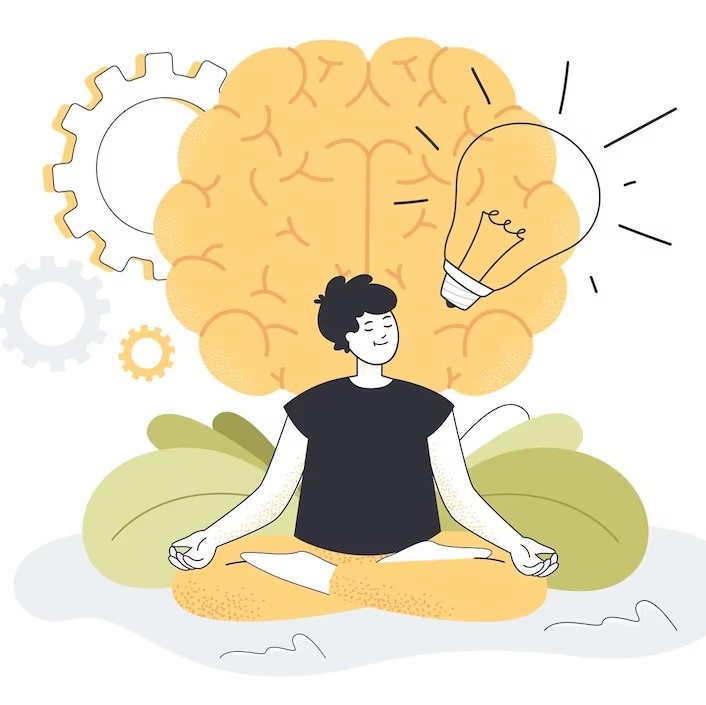How to Boost Your Flirting Confidence Through Self-Reflection
I: Boost Your Flirting Confidence Through Self-Reflection
Flirting can be a daunting experience, especially if you lack confidence or have had bad experiences in the past. However, self-reflection is a powerful tool that can help you build your flirting confidence. Taking the time to reflect on your past experiences, your strengths and weaknesses, and your personal goals can help you understand what you have to offer and what you need to work on. As you reflect on your experiences, you may begin to see patterns or recurring themes that can inform your future flirting tactics.
Self-reflection can also help you identify any limiting beliefs or negative self-talk that may be holding you back. Many people have a negative voice in their head that tells them they are not good enough or that they will never be successful in dating. By acknowledging and challenging these limiting beliefs, you can reframe your mindset and approach flirting with a more positive and confident attitude. This can make a huge difference in how you come across to others and how you feel about yourself.
Finally, self-reflection can help you set realistic flirting goals and track your progress over time. By setting specific, measurable goals, such as initiating conversation with one new person each week or practicing positive self-talk daily, you can hold yourself accountable and see tangible results. Celebrating your successes along the way can help motivate you to continue pushing yourself out of your comfort zone and building your flirting confidence. With time and practice, you may find that flirting becomes more natural and enjoyable, leading to more fulfilling social and romantic connections.
II: Identify Your Flirting Blocks
The act of flirting is an art that can be practiced by anyone. However, some people may find it challenging to engage in flirting due to certain blocks. These blocks could be physical, emotional, or mental. A physical block could be a lack of confidence in one's appearance or being too self-conscious about physical flaws. An emotional block could be a fear of rejection or past traumas that have resulted in insecurities. A mental block could be a lack of knowledge on how to flirt or a belief that flirting is wrong. Identifying these blocks is essential in overcoming them and becoming a better flirter.
The next step after identifying your flirting blocks is to address them. For instance, if your block is a lack of confidence, try affirming yourself with positive self-talk or engaging in activities that make you feel good about yourself. If your block is a fear of rejection, try to understand that rejection is a normal part of life and not a reflection of your worth as a person. If your block is a lack of knowledge on how to flirt, educate yourself through books, articles, or seeking the advice of someone who is good at it. Whatever your block may be, there is always a way to overcome it.
Overcoming your flirting blocks might not happen overnight, and it might take time to get comfortable with the flirting process. However, it's essential to remember that flirting is not about being perfect, but about being yourself and having fun. As you work on overcoming your blocks, try to remain patient, kind, and compassionate toward yourself. Don't let setbacks discourage you, and enjoy the process of flirting as you become more comfortable with it. Once you overcome your blocks, you will discover that flirting can be a fun and fulfilling aspect of your life.
III: Recognize Your Strengths and Weaknesses
Knowing your strengths and weaknesses is an essential aspect of personal development. Being aware of your strengths allows you to build upon them and excel in areas where you feel confident. Recognizing your weaknesses, on the other hand, helps you identify the areas that require improvement, so that you can work on them and not let them hold you back in life. Acknowledging your strengths and weaknesses is the first step towards personal growth and achieving your goals.
To recognize your strengths, think about the things that come naturally to you, the tasks that you enjoy doing and receive positive feedback on. These can be talents, skills or personal attributes that set you apart from others in a positive way. Once you've identified your strengths, make a conscious effort to leverage them in your personal and professional life. For instance, if you excel at communication, you can use that strength to build better relationships and advance your career.
Similarly, identifying your weaknesses is equally important. These are areas where you struggle or don't perform well, and can hinder your progress if not addressed. Instead of avoiding or denying them, face them head-on and work towards improving them. This could involve seeking feedback from others, taking courses, or simply practicing until you improve. By recognizing your weaknesses and addressing them, you can turn them into strengths over time, and become a more well-rounded individual.
IV: Reassess Your Goals and Motivations
Reassessing your goals and motivations is an important step to take if you want to achieve success and fulfillment in your personal and professional life. Too often, we get caught up in the day-to-day tasks and forget about the bigger picture. By taking the time to reflect on what you want to achieve and why, you can ensure that you are on the right track and making progress towards your goals. This can be a difficult process, as it may require you to confront your fears, insecurities and past failures. However, it is also a transformative one, as it allows you to gain insight into who you are, what you value and what you need in order to be happy.
When reassessing your goals, it is important to be honest with yourself about what you truly want. It's easy to get caught up in what society or others may expect of you, and neglect your own desires and aspirations. Ask yourself tough questions and try to identify any patterns in your behavior or thinking that may be holding you back. For example, you may find that you have been pursuing a career path that doesn't align with your values, or that you are not giving enough attention to your personal relationships. By being aware of these issues, you can begin to make changes that will bring you closer to your ideal self.
In addition to reassessing your goals, it's also important to examine your motivations. Why do you want to achieve these goals? Is it for personal fulfillment, financial gain, or a desire to impress others? Understanding your motivations can help you to stay focused and committed, even in the face of challenges and setbacks. It can also help you to make better decisions about what actions to take, and why. Remember that your motivations may change over time, and that this is normal. To stay true to yourself and your goals, it's important to regularly reassess and adjust your motivations as needed.
V: Create Positive Affirmations
Positive affirmations are powerful tools for developing an optimistic mindset. They help you overcome limiting beliefs and negative self-talk, and they can boost your self-esteem and confidence. To create effective affirmations, you need to focus on what you want to achieve and avoid using negative language. Instead of saying "I'm not good enough", say "I am confident in my abilities and skills". Repeat your affirmations daily, visualize yourself achieving your goals, and feel the positive emotions associated with your affirmations.
When creating positive affirmations, it's important to use present tense language as if you have already achieved your goals. Use specific and concrete language to make your goals more tangible and achievable. Focus on the positive aspects of your life and avoid dwelling on negative experiences. Affirmations are a way to reprogram your mind to focus on the good things in life, and by doing so, you attract more positive experiences into your life.
Positive affirmations can be used in many areas of your life, including relationships, career, finances, and health. Whether you want to attract abundance, improve your self-esteem, or develop a positive mindset, affirmations can help you achieve your goals. Remember that affirmations are powerful tools, but they are not magic. You still need to take action and work towards your goals. However, by using affirmations, you can overcome limiting beliefs and develop the resilience and determination you need to succeed.
VI: Find a Support Network
A support network is a essential part of any person's life. It's a group of individuals who can provide emotional, mental, and physical support when you need it the most. Your support network can be composed of family members, friends, colleagues, or professionals. The important thing is that you establish a network of people who are reliable, trustworthy, and supportive. In times of trouble or when you need encouragement, your support network can be a valuable resource in helping you navigate life's challenges.
Building a support network takes time, effort, and commitment. You need to actively seek out people who share your interests, values, and goals. Join clubs, attend events, and participate in social activities where you can meet new people. You can also connect with others through online communities or professional organizations. It's important to be open and honest with those you want to have in your network. Let them know what you need from them and how they can help you. Share your experiences and listen to theirs. Remember, a support network is a two-way street.
Maintaining your support network requires effort and dedication. You need to nurture your relationships by staying in touch, being there for others, and celebrating their successes. Show your appreciation and gratitude for those who support you. Be willing to give as much as you receive. And remember, it's okay to ask for help when you need it. Your support network is there to help you through life's ups and downs. Embrace it, cherish it, and let it guide you on your journey.
VII: Reframe Negativity
The world can be a negative place, and it's easy to get caught up in it. But reframing our thoughts and attitudes can make all the difference. Instead of dwelling on the negative, we can focus on the positive, and we may find that our perspectives and experiences are transformed. Reframing negativity doesn't mean ignoring problems or pretending that everything is perfect. It's about approaching challenges with a positive mindset and finding solutions rather than becoming overwhelmed with despair. Through reframing, we can learn to see challenges as opportunities for growth and change, rather than insurmountable obstacles.
Reframing negativity also involves being mindful of our language. The way we speak and the words we choose can have a profound impact on our thoughts and emotions. Instead of using catastrophic language that portrays situations as far worse than they actually are, we can choose to be more measured and balanced in our descriptions. This doesn't mean minimizing or dismissing legitimate concerns, but rather approaching them in a way that is constructive and empowering. The way we talk about negativity can either perpetuate it or help us to move beyond it.
Ultimately, reframing negativity is a way of taking control of our thoughts and emotions, rather than letting them control us. By focusing on the positive, using empowering language, and looking for solutions rather than dwelling on problems, we can cultivate a sense of resilience and optimism that allows us to thrive in even the most challenging circumstances. It's not always easy, and it may take practice, but the rewards are significant: a sense of inner peace, a greater appreciation for life, and the ability to rise to any challenge with confidence and grace.
VIII: Prioritize Self-Care
Prioritizing self-care is crucial for maintaining physical, mental, and emotional health. Self-care can take many forms, including exercise, healthy eating habits, adequate sleep, and stress management techniques such as meditation or yoga. Neglecting self-care can lead to feelings of exhaustion, burnout, and low mood. By making self-care a priority, individuals can not only improve their own well-being but also be better equipped to handle the demands of their daily lives.
Self-care does not have to be time-consuming or expensive. Even small acts of self-care, such as taking a few minutes to stretch, drink water, or breathe deeply, can have a powerful impact on overall wellness. Self-care is not a luxury, but a necessity. It is important to recognize that taking care of oneself is not selfish, but rather an act of self-preservation. By investing in one's own health and well-being, individuals can become better partners, parents, friends, and coworkers.
Self-care can also help individuals achieve their goals more effectively. When individuals neglect their own needs, they may find it difficult to focus on tasks or be creative. By prioritizing self-care, individuals can strengthen their physical and mental abilities, leading to increased productivity, focus, and overall satisfaction. As the saying goes, "you cannot pour from an empty cup." By taking care of themselves first, individuals can be better equipped to help others and achieve success in their personal and professional lives.
IX: Recognize Other People's Positive Qualities
As human beings, we often have a tendency to focus on the negative aspects of those around us. We criticize, judge, and compare ourselves to others, rather than recognizing and acknowledging their positive qualities. However, taking the time to recognize the good in others can have a profound impact on our relationships and our own well-being. When we shift our focus to the positive, we become more compassionate, empathetic, and understanding, which allows us to build stronger connections with those around us.
Recognizing the positive qualities in others also helps us to let go of our own insecurities and fears. When we are constantly comparing ourselves to others, we become consumed with self-doubt and negative self-talk. However, by acknowledging the strengths and abilities of those around us, we can learn to appreciate our own unique qualities and be more accepting of ourselves. This in turn leads to a greater sense of confidence and self-worth.
Finally, recognizing the positive qualities in others helps us to create a more positive and supportive community. By focusing on the strengths and contributions of those around us, we can build a culture of collaboration and inclusivity, where everyone feels valued and appreciated. This not only benefits our own well-being, but also leads to more productive and successful group dynamics. So, next time you find yourself judging or criticizing someone, take a step back and try to recognize their positive qualities instead. It may just change your perspective and lead to a more positive and fulfilling life.
X: Be Mindful of Your Intuition
Intuition is often considered a mysterious and elusive phenomenon, but it is an innate ability that everyone possesses. It is the ability to sense or know something without the need for conscious reasoning or logic. Listening and paying attention to your intuition can be a powerful tool in making decisions and navigating through life. However, it can be easy to ignore or dismiss our intuition, especially when it goes against our rational thinking or societal norms.
One way to be mindful of your intuition is to cultivate a practice of self-awareness and mindfulness. This involves being present in the moment and focusing on your thoughts, feelings, and physical sensations. By creating a space for introspection and reflection, you can become more attuned to your intuition and trust yourself. It is important to distinguish between fear-based intuition and authentic intuition. Fear-based intuition often stems from past trauma or anxiety and can lead to irrational decision-making. Authentic intuition, on the other hand, is grounded in your inner knowing and leads to alignment and fulfillment.
Incorporating intuition into your decision-making process can also lead to greater success and happiness. This is because intuition often takes into account the bigger picture and can offer insights and solutions that logic cannot. While it is important to use rational thinking and analysis in decision-making, it is also crucial to listen to your gut instincts and intuition. By embracing and nurturing your intuition, you can tap into your inner wisdom and live a more authentic and fulfilling life.
XI: Don't Rush Things
Many people these days have a tendency to rush things. They want everything to be done quickly and efficiently, without taking the time to properly plan and analyze what needs to be done. However, this approach can often lead to mistakes and problems down the road. It is important to take your time and carefully consider your options before making any decisions. Rushing things may provide a quick fix in the short term, but it can have negative consequences in the long run.
When you rush things, you may miss important details or overlook potential issues. This can lead to mistakes, which can be costly and time-consuming to fix. Taking the time to properly plan and evaluate your options can actually save you time and money in the long run. By carefully considering your options and taking a methodical approach, you can ensure that you are making the best possible decisions for your situation.
In addition to avoiding mistakes, taking your time can also help you to make better decisions overall. When you rush things, you may make decisions based on incomplete information or without considering all of the possible outcomes. By taking the time to fully evaluate your options, you can make more informed decisions that are based on a solid understanding of the situation. This can help you to achieve better results and avoid making costly mistakes.
XII: Cut Yourself Some Slack
Cutting yourself some slack is something that many people struggle with. Many of us are our own worst critics, and we hold ourselves to incredibly high standards. While there's nothing inherently wrong with having high expectations for yourself, it can become a problem when you never give yourself a break. Remember that everyone makes mistakes and has bad days from time to time. It's important to give yourself permission to mess up and not beat yourself up about it.
When you're constantly pushing yourself to do more and be better, it can be hard to take a step back and relax. However, taking time to rest and recharge is crucial for your mental and physical health. It can be difficult to prioritize self-care when there are so many other things demanding your attention, but it's important to remember that you can't pour from an empty cup. By taking care of yourself first, you'll be better equipped to handle whatever challenges come your way.
If you're someone who struggles with perfectionism or overachieving, cutting yourself some slack may not come naturally. It might feel uncomfortable or even scary to let go of some of that pressure you've been putting on yourself. However, learning to be more forgiving and understanding of yourself will not only improve your well-being but also your performance. When you're not constantly stressed and burnt out, you'll have more energy and creativity to bring to your work and relationships. So, give yourself a break and see how much of a positive impact it can have on your life.
XIII: Have Fun
Article XIII of the Universal Declaration of Human Rights states that everyone has the right to rest and leisure, including the right to enjoy and participate in cultural life. This emphasizes the importance of having fun in one's life - not just for sheer pleasure, but also for personal and societal benefits. Taking breaks from work and routine stressors can reduce the risk of burnout and improve mental health. Participating in cultural activities like music, art, and theater can enhance creativity and promote intercultural understanding. Ultimately, having fun can contribute to a more well-rounded and fulfilled life.
It is important to note that having fun does not have to involve extravagant experiences or costly activities. Even simple pleasures like spending time with loved ones, reading a book, or taking a walk can bring joy and relaxation. Moreover, having fun should not be seen as a luxury or a guilty pleasure, but as a fundamental aspect of self-care and personal development. In fact, studies have shown that making time for fun activities can increase productivity and improve overall quality of life. So, whether it's trying a new hobby or indulging in a favorite pastime, taking time to have fun is an essential part of being human.
Unfortunately, in today's fast-paced and competitive world, many individuals feel pressured to dedicate their time and energy solely to work and other responsibilities. This can lead to a culture of overworking and burnout, where leisure and relaxation are seen as unproductive or even shameful. However, by embracing the right to rest and leisure outlined in Article XIII, society can shift towards a healthier and more fulfilling work-life balance. Encouraging and supporting individuals to have fun and participate in cultural activities can promote not only individual well-being, but also intercultural understanding and community building. Ultimately, embracing the importance of having fun can lead to a more harmonious and enriching society for all.



